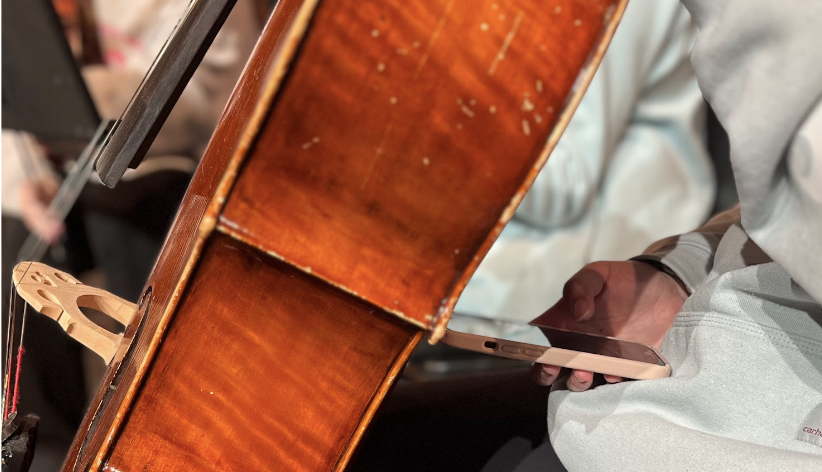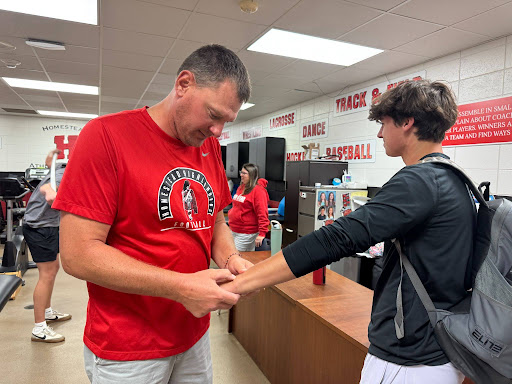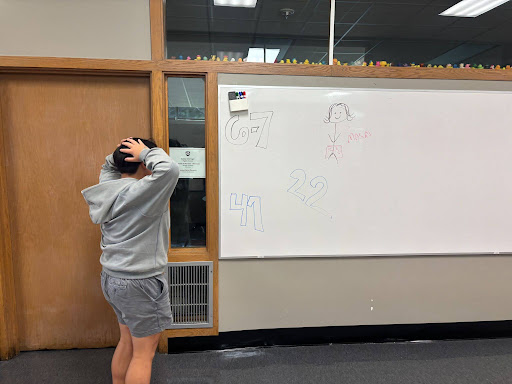The bell signifying the beginning of third hour after A lunch rings over the loudspeakers, being drowned out by the sounds of chatter that flood from the lunchroom into the 700 wing. Class has begun, but the orchestra students do not seem to move from their chosen locations on the wide array of couches that John Emanuelson, orchestra teacher, has provided for his students to use during lunch or before rehearsal. Emanuelson interrupts his students to tell them that rehearsal needs to start.
“Everyone unpack your instruments and take a seat, so we can start our rehearsal,” Emanuelson instructs his class as he makes his rounds to every couch, encouraging kids to stand up.
While some students follow the instructions and swiftly take their positions in their chairs and begin placing their music on their stand, other students seem to struggle to listen to Emanuelson the first time, or the second time or even the third time.
Finally, once all students have taken their seats, typically well past the bell after some sluggish students draw out the transition time, Emanuelson begins rehearsal with now less than 75 minutes, which is sprinkled with students talking to one another across the orchestra, students haphazardly plucking and bursting out playing when it is not time to play and students going on their phones while Emanuelson is teaching.
These disruptive behaviors are not unique to just Emanuelson’s third hour class; likewise, according to a recent national survey conducted by EdWeek Research Center, more than 70% of 1,000 educators said that students are misbehaving more now than they did before the pandemic in 2019. Additionally, Jason Okonofua, an assistant professor of psychology at the University of California – Berkeley, who has studied discipline in K-12 schools said to USA Today, “Discipline is becoming a real issue again and some things that we were hoping were getting better are starting to look like they might be getting worse.”
With this national rise in misbehavior following years after the pandemic, Homestead has not been exempt from these new-found challenges.
“When we came back from online learning and had all students back in school together, it was noticeable some of the behaviors that individual and groups of students had; understanding how to behave in a classroom, normal operations and expectations of the way things should look in a classroom needed to be reiterated over and over and over again,” Eric Ebert, principal, said.
Now in 2024, there is still evidence of this national pandemic in the behavior of students who were in school in 2020 during this peculiar time.
“I have noticed both declining ability to concentrate in some students and then the associated misbehaving that comes from not being able to concentrate,” Emanuelson stated.
Emanuelson compared students’ inability to concentrate to an “ineffective shopping trip.”
“Everytime they are sitting down it is just zipping around the grocery store, grabbing this and that off the shelf, instead of a purposeful scanning through the aisle and looking through the part of the store that you want to be in,” Emanuelson illustrated.
These unconventional behaviors from students have made an impact on the learning environment for other students that are in the same classroom.
“It gets me really agitated, and it makes me really mad. I don’t want to go to Orchestra anymore because I know it is going to be really annoying to sit through all of that. And it also takes away from my learning because Mr. E now has to spend his time telling people to be quiet when I just want to play music, and then class gets boring and then it is just Orchestra isn’t fun,” Sadie Ferguson, senior, confessed.
These noticeable adverse behaviors are not unique to just the orchestra room, it can be seen in other academic classes around the school.
“I feel like now it is more childish things that you don’t usually see in high school, like a lot of touching and a lot of middle school behaviors that prior to the pandemic we really didn’t see,” Monique Porter, assistant principal, shared.
While these are some issues that are present around the nation and at Homestead that do not have a clear cause, with fingers pointing to missed middle school experience and increased screen time, decreasing attention spans; nevertheless, administrators and teachers have been working diligently the past few years to get the school community back to pre-pandemic behaviors.
“I will tell you that those behaviors are getting better and better, and I think we are in a really good place right now in 2023-24 that would be even more similar to pre-pandemic. The one issue that remains as a behavioral issue that is yet to be fixed is attendance. That is a major concern. Attendance is a behavior. The rate of chronic absenteeism is higher today than it was in 2018-19,” Ebert revealed.
Being chronically absent means a student is gone for more than 10 days or 50 class periods in the school year. It is against Wisconsin state law to be gone for more than 50 class periods at Homestead, so administration uses the School Resource Officers and court system to issue truancy tickets as necessary.
“There was a time where leaving school just to go to Starbucks was not a thing or even being late. [Attendance] is not a priority anymore,” Porter commented.
“[These behaviors] have forced us to look at our policies and make changes like our exam exemption policy. We had to include the excused tardies because students are getting called out first period. They are getting called out by their parents and, you know what, it is not ok to be late. It is proven that if students are out of class they are missing content and they are losing minutes, so it is just important to know that is why that rule was put into place,” Matt Zavada, assistant principal, stated.
While there are a wide array of issues present at Homestead following the pandemic, members in the community are optimistically working together to work back to how teaching and learning was pre-pandemic.
“When I went into education, I went into the business of working with people, instead of music, in addition to music of course, but it has got to be a people-first bargain. If you love music and you can deal with people then you shouldn’t be a school teacher…I still believe that fundamentally that my students are committed to and enjoy the process of learning orchestra music with each other in class. I have no evidence that that is not the case. They have other temptations and distractions in their life…So I love the challenge, it keeps me fresh, it makes me question my approach,” Emanuelson articulated.
“The policies are there, it just really comes down to the individual conversations with students, with the teachers, and with us, as administrators, with parents, always including them in on the conversation and every opportunity for us to work through a behavior incident is an opportunity to learn and to grow. We expect students to learn from that mistake—students make mistakes, kids make mistakes—but learn from it and move forward, and the issue is when we have to keep having those conversations that ‘you are not learning from this,’ so what is the next step, and we have to work with families on that,” Zavada affirmed.








